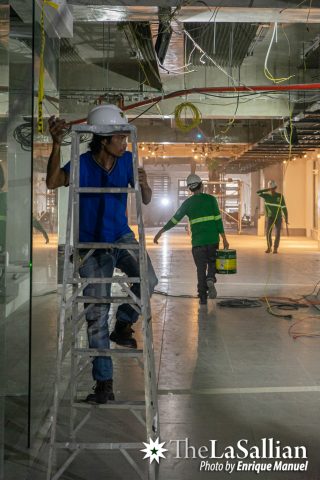“Concerns regarding the contractor’s scheduling of manpower and delivery of materials have caused the project timeline to adjust.”
This is the statement given by Associate Vice Chancellor for Campus Development Josemari Calleja regarding the delays on the Gokongwei Hall renovations, which has been under construction for more than eight months.
Housing most of the courses for the students of the College of Computer Studies, the building’s renovations were announced as far back as June 16 of last year, much to the dismay of some students and faculty members. Although students agreed that the building was in dire need of improvements, frustrations have only lingered as the ongoing construction still causes distractions for classes within the building, despite initial plans to have renovations done by October 2019.
Calleja, however, declined to comment on the delays attributed to McDonald’s, the restaurant expected to have a space in the building, as he explained that the construction and future operations of the branch is under the discretion of the food company.

Growing concerns
What spurred the reconstruction of the Gokongwei Hall was the need to “increase the number of available classrooms in the Manila Campus,” Calleja explains. The ground floor of the building will be converted into “learning spaces” given its relative accessibility to the student population.
He also suggests that the additional rooms on the ground floor can alleviate the students’ need to climb upper floors to go to their classes. “This [will help] decrease foot traffic in our staircases and in our elevators,” he justifies.
Flooding and rainwater have also been a recurring problem for the building. Calleja mentions that housing “desktop computers” that keep important files and other electronic gadgets in Gokongwei Hall would best be avoided.
To address the flooding problems cited by Calleja, the ground floor of Gokongwei Hall was also elevated “about half a meter.”
Continuing plans
Among the initial plans that have been retained in the reconstruction include “generally better” ventilation integrated into the building space. Calleja also promises “more seating options suited for various modes of study”, though he did not expound in detail.
The 24-Hour Study Facility program will also resume in Gokongwei Hall after the construction is finished, he says. Until then, the ground floor of the Br. Andrew Gonzalez Hall will remain as the temporary site for the 24-hour facility.
Plans on how they can execute the allocation of space for the ground floor of Gokongwei Hall were also described in detail. Rooms would have “collapsible walls”, providing an area that could adapt to different situations, Calleja suggests.
“We’re excited to see how the students will use these new spaces,” he affirms.
Expanded partnership
Another planned addition to Gokongwei Hall is a McDonald’s branch, which Vice Chancellor for Administration Dr. Arnel Uy reveals is expected to operate for 24 hours.
“Nagbigay sila ng pahayag [to open a McDonald’s branch]; pinag-aralan [namin], at sinabi [namin] na, siguro, maganda nga na gawin natin ‘to at yung nakita nilang lugar ay iyon,” Uy recollects.
(They gave a proposal [to open a McDonald’s branch], we studied it, and determined that it might be good for us to do it here.)
Although the restaurant plan had only started to materialize, the partnership between the company and the University had already been in place long before the reconstruction of Gokongwei Hall started.
George T. Yang, Chairman of McDonald’s Philippines, has already collaborated with DLSU in the past, Uy reveals. Located on the sixth floor of the Enrique M. Razon Sports Center, the George T. Yang Performing Arts Studios, which are currently being used by groups under the Culture and Arts Office, is an example of the fruits of the University’s partnership with the businessman.
Students in waiting
Although there are multiple planned developments in Gokongwei Hall, students who frequent the building still raise concerns over the renovation. Among the common issues they point out is the noise level from the construction.
Alexandra Mangune (II, CS-ST) says that the lengthy construction is an “inconvenience” to students. “It disrupts classes,” she explains. Similarly, Matthew Lim (II, BSINSYS), who also takes his classes in the same building, shares that the noise during construction “can be distracting during exams”.
Lim acknowledges, however, that delays in construction can be inevitable, saying, “Delays, when it comes to renovation, is a given maybe because of inaccuracies in the way they schedule and set deadlines.” However, he also expresses worry with the ongoing renovation already going beyond the original expected completion date.
Br. Andrew Gonzalez Hall as the current site of the 24-Hour Study Facility Hall has also been a source of complaint for students due to its smaller space in comparison to Gokongwei Hall. Mangune narrates that she used to maximize the study space on the ground floor of the Gokongwei building during breaks.
Lim shares similar sentiments, revealing that there are fewer available facilities in the Br. Andrew Gonzalez Hall, with a scarcity of chairs, tables, and outlets often plaguing students who try to study there.
The clamor of students for the return of Gokongwei Hall’s ground floor continues. Yet with delays already extending to more than four months, students and members of the faculty can only hope to endure until the project’s completion.
